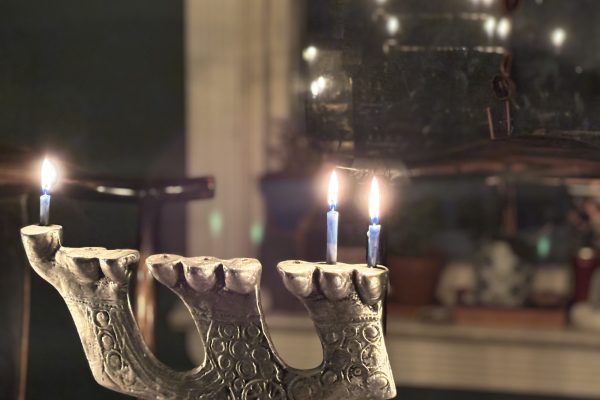Week 1: Hesed (Love, Kindness)
As we begin Counting the Omer, each day’s quality intersects with Hesed, inviting us to contemplate various dimensions of love/kindness. We invited writers to reflect on each daily theme as part of Ritualwell’s annual Omer Fundraising Campaign. You may download a full PDF for this week at the bottom of this page. As you gather inspiration for your Omer journey, please take a moment to support Ritualwell so we can continue to offer you free, meaningful content all year long. Thank you!
Hag Sameakh!
Hila Ratzabi
Managing Editor, Ritualwell
Artwork: Omer 2018
D’vorah Horn
Sign up for daily Omer inspiration emails here.
Day 1: Hesed of Hesed
The way to begin: wrap love in love, rest head in Palm, cradle body, flow from above unhindered. Father-mother yourself like a new people. Melt at the scent of the Beloved. Remember your names.
—Rabbi Tamara Cohen
Day 2: Gevurah of Hesed
Do not give till you bleed.
Bleeding is messy
and is not necessary.
An open heart
has its own strength
its own borders.
Kindness fits
within the space, just so,
so sweetly, like flowers
in a field,
a riot of colors
and glory.
—Stacey Zisook Robinson
Day 3: Tiferet of Hesed
The beautiful splendor of a simple act of kindness is most pronounced when it is done with a loving heart. Act for love and you will find beauty.
—Rabbi Elyse Wechterman
Day 4: Netzach of Hesed
Blessed One-ness,
When I have a choice,
I choose to survive.
When I have a choice,
I choose to listen.
When I have a choice,
I choose to atone.
When I have a choice,
I choose to be kind.
When I don’t have a choice,
I choose to pray.
—Trisha Arlin
Day 5: Hod of Hesed
Profound love has prolific power to produce a peace that permeates the heart and spirit. Its power can heal past pain, create a purposeful present filled with forgiveness, and inspire hope for the future.
—Dr. Tarece Johnson
Day 6: Yesod of Hesed
Part of the foundation of Jewish living is to be found in hesed, covenantal caring and lovingkindness. That kindness is an aspect of divinity that affects how individuals treat themselves and each other, as well as groups and communities. There is no such thing as too much caring, too much love, too much thoughtfulness. The practice of kindness to self and others can uplift and reshape the texture of our lives; it is a key to authentic Jewish living.
—Rabbi David Teutsch
Day 7: Malchut of Hesed
In entering exile with Am Israel, the Shekhinah embodies malchut b’chesed—sovereignty in lovingkindness. In giving up her throne to suffer alongside her people, the Shekhinah teaches us both grace and empathy.
—Sivan Butler-Rotholz











